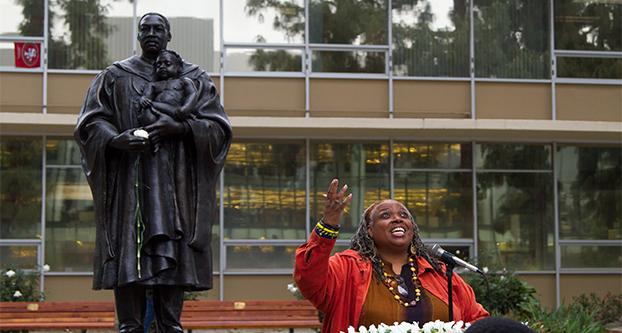
Fresno State students gathered Tuesday morning in the Peace Garden at the statue of Martin Luther King Jr. to join together in commemoration and celebration of King’s life and works.
The theme for this year’s celebration was “living the dream for humanity, yourself, your country, and your world.” Sponsored by the Central Valley Cultural Heritage Institute, students were welcomed to sign posters and speak openly about the personal impact King’s message has on their own lives, as well as that of the community and nation.
Vice President of Student Affairs Dr. Frank Lamas, a guest speaker for the commemoration, said that King was one of his own personal heroes growing up as a child.
“Because of what he stood for and what he did for our society,” Lamas said, “he was such a champion for us all.”
Lamas also said that he strove to emulate King’s message both as an administrator and as a member of the community.
“When I became a young professional, I decided I was going to put a picture of his on my wall with the speech outlined on the bottom,” Lamas said. “His words and his message really resonated with me to make a difference in my life in the things that I do not only campuswide, but in our community and the world. It’s a real lesson to all of us to look at our lives and see how we can make a difference.”
As a result of the Campus Annual Diversity Conference in 2013, the Central Valley Cultural Heritage Institute created the “Dogs United” campaign to increase cross-cultural interaction and promote diversity on campus.
Dr. De Anna Reese, Africana studies program coordinator at Fresno State, spoke about King’s legacy, calling him a “drum major for justice as one of the forefathers for today’s activist movement.”
“He was one of the most iconic figures of the 20th century,” Reese said. “His name is synonymous with courage and hope. He gave not only this nation but people around the world a new focus, a new direction and a new sense of self.”
Reese also challenged spectators to learn something new about King and the civil rights movement, proclaiming that the holiday was not just a day of vacation but a day of service.
“One of my favorite quotes by Dr. King is ‘our lives begin to end the day we are silent on things that matter’” Reese said, “and so 47 years after his death, and 52 years after his historic I have a dream speech, this particular quote is one of the ways we can think about the words and writings of Dr. King and how relevant they are now as they were during the time he lived.”
Continuing on the theme of social activism within the community, Reese said that King would be saddened by what she calls an epidemic of racial bias, police violence, and the lack of accountability in the nation’s police forces.
“I think Dr. King would demand that we as a nation and a community take a more aggressive stance on enforcing civil rights,” Reese said. “I also think that he would condemn and oppose the nagging persistence of poverty in underserved communities across this nation,” a poverty rate, Reese said, that is double for the African-American Community compared to the rest of the nation.
“I think that this remains a staggering blight upon our government as well as the disregard of our society,” Reese said.
King’s legacy, Reese said, should be synonymous with the remembrance of the rights we have today, as well as those who paid for them.
“The freedom of religion, the right to an education and the right to vote-all of those freedoms would not have been made possible without those that have paid a very high price in order that you and I can live in a world where there is a lot less hatred, and also where differences are celebrated,” Reese said.
“King’s legacy reminds us of how important human life is,” Reese said. “He reminds us that we must be passionate and relentless in the fight for justice, to renew our commitment to advocate for those who cannot do so for themselves, and of the power of what we can do when we join together for change.”




